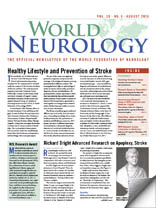Since its establishment in 1982, the Korean Neurological Association (KNA) has demonstrated stable growth over the last three decades, and a lot of effort has been made to take the KNA to a global level. (For more, see “Changing Face of KNA” in Neurology 2013;80:1145-1147). Keeping up with the 30th anniversary of the KNA in November 2012, the KNA is currently preparing to make a new leap forward by planning to host WCN 2017 in Seoul.
The members of the KNA strongly believe that hosting the event for the first time in Korea can be meaningful since it will be a great opportunity for them to thank those who helped end the Korean War 60 years ago. It will be amazing for all our professional colleagues to see the unprecedented progress that Korea has made over the last six decades. Furthermore, it will be truly uplifting for those colleagues whose ancestors actually helped us during the war as they see the amazing impact that their sacrifices have brought to all Koreans. This is the reason that the KNA is so eager to host WCN 2017.
Foundation, Development of KNA
The KNA had a late start as an independent branch of the Korean Medical Association due to a rigid medical board system led by the government that did not easily permit the existence of an independent neurologic association. Through many struggles with other related fields, however, the KNA became a separate entity as an official independent academic association in 1982. The following year, the KNA began issuing the Journal of KNA. In 2005, the KNA began to issue a separate English journal, the Journal of Clinical Neurology (JCN; http://thejcn.com/) to help international readers. The JCN is published quarterly and is indexed in the SCI-E (impact factor in 2012: 1.892). In 1996, the KNA successfully held its first international conference, the Ninth Asian and Oceania Congress of Neurology (AOCN). Inspired by this success, KNA members have become more actively involved in international academic societies. Over the last decades, the KNA has made numerous achievements in the development of the fields of neurology and neuroscience, and has contributed to public health as well.
Current Activities of KNA in Korea
The number of total residents and board-certified members in neurology in Korea increased sharply to about 1,800 members. Since the late 1990s, the KNA has facilitated the establishment of diverse subspecialty societies, and has actively expanded academic exchanges with other countries. Starting with the Korean Epilepsy Society in 1996, 14 subspecialty societies have been founded.
International Activities
One of the major activities of the KNA is international collaboration. The KNA has been putting much effort to build relationships and tighten the ties between Korean neurology and other parts of the world. The KNA has been participating in the East Asian Neurology Forum to share academic knowledge and regional concerns with the neurologic societies of Japan and Taiwan. Along with the Ninth AOCN in 1996, which was the first international academic meeting hosted by the KNA, the Ninth World Congress on Sleep Apnea (WCSA 2009), organized by the Korean Society of Sleep Medicine, and the Seventh World Stroke Congress (WSC 2010), organized by the Korean Stroke Society, were landmark events that strengthened the international network.
Why Seoul as Host for WCN 2017?
Active support from the Korean Government
 The Korea Tourism Organization (KTO) and Seoul Tourism Organization (STO) will provide both financial and promotional supports to WCN 2017 to be held in Seoul. The Korean Government, including the Seoul Metropolitan City, sincerely welcomes the World Congress of Neurology and looks forward to meeting the members in Seoul, South Korea, in 2017.
The Korea Tourism Organization (KTO) and Seoul Tourism Organization (STO) will provide both financial and promotional supports to WCN 2017 to be held in Seoul. The Korean Government, including the Seoul Metropolitan City, sincerely welcomes the World Congress of Neurology and looks forward to meeting the members in Seoul, South Korea, in 2017.
The KNA has extensive experiences in hosting international congresses
Recently, the KNA has successfully hosted many international congresses in diverse fields of neurology. These experiences will certainly help make WCN 2017 a great success.
Providing opportunities for contribution to WFN to new members
By helping the KNA to host WCN for the first time, all members will be inspired by an equal opportunity policy that the WFN pursues in making contributions to the society.
Special considerations provided to participants from developing countries
Diverse academic and financial support programs are available for participants from the developing countries in regards to registration fees, accommodations and travel grants.
Convenience during the whole stay from arrival to departure
The award-winning airport, comfortable accommodations, go-anywhere transportation, attractive places to see, convenient shopping and more create a most memorable trip for all participants.
See, Hear, Feel Korea
Korea offers an abundance of activities and festivals including Temple stay, DMZ tours, traditional SPAs, which are only available in Korea. Korea, with the 5,000-year history embraces the cosmopolitan flair of modern cities. Korean history stretches back thousands of years, and its culture is rich, complex and totally unique. Various palaces, fortresses, gates, museums and monuments are located all over Seoul, allowing visitors to experience the rich historical assets first hand.
Above all, the enthusiasm of KNA for the WCN 2017
Despite aforementioned advantages, nothing can be more important than the enthusiasm of Korean neurologists in hosting this glorious congress for the neurologists from all over the world. We believe that our enthusiasm for hosting the WCN 2017 in Korea will be the main key for the success of the WCN 2017.
